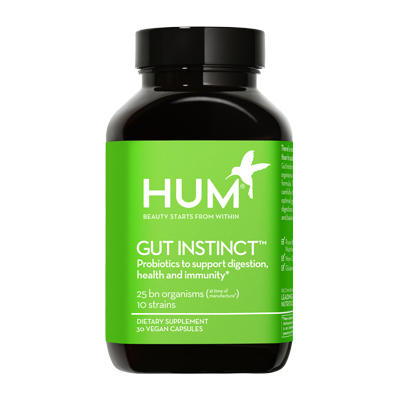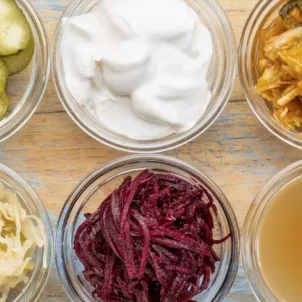Here’s a comprehensive look at the strong links between gut health and the immune system. Plus: Understanding the gut microbiome and tips for a healthier gut.
Most people think of the immune system as a diffuse collection of cells, floating through the bloodstream, searching for invaders to destroy. But if you only look in the blood, you’ll miss the majority of immune cells.
That’s right. Most immune cells—about 70 percent of them—are located in the gut!
Also in the gut is the gut microbiome—a vast system of bacteria and other microbes that outnumber human cells, according to the latest estimates, by a factor of 1.3. These gut flora not only have a profound impact on the immune system; they’re also influenced by diet and lifestyle.
If you want to support a healthy gut (and therefore a healthy immune system), read the diet and lifestyle tips concluding this article. First, though, let’s cover some basics on the gut microbiome and how it affects immunity.


What Is the Gut Microbiome?
Your gut doesn’t only contain human cells. It also contains bacteria, fungi, viruses, and parasites. Together, these gut-dwelling microbes comprise the gut microbiome. The gut microbiome has evolved with humans over millions of years, generally in a symbiotic fashion. In return for a place to hang out, our resident microbes help us digest food, synthesize vitamins, produce energy, reduce inflammation, regulate the immune system, and protect against dangerous pathogens. Generally speaking, some gut flora are considered “good” (health-promoting) while others are considered “bad” (health-detracting). In the good category fall bacteria in the lactobacillus and bifidobacterium genera, and in the bad are some types of Streptococcus (strep) bacteria, a fungus called candida, and a variety of parasites. Unfortunately, it’s not always that simple. Some people, for instance, suffer from an overgrowth of “good” lactobacillus bacteria, while others coexist in perfect health with candida or parasites. Confused? That’s okay. The gut microbiome bewilders scientists, too. For now, understand that gut microbes are highly individual. One person’s healthy gut flora might be another’s unhealthy gut flora. But that doesn’t mean you can’t take positive steps towards improving your situation. We’ll get to that soon. Next we’ll cover how the gut microbiome, and the gut environment in general, impacts immunity.
How Gut Health Affects the Immune System
It’s one thing to know that 70 percent of your immune cells reside in the gut. It’s another thing to understand, beyond mere trivia, how gut health and the immune system interrelate. To simplify this tangled topic, let’s look at a few specific examples.The Gut Barrier
Along with skin, the gut barrier is your first line of defense against pathogens. It’s like a gatekeeper: letting the good (food) in and keeping the bad (germs) out. The gut microbiome helps maintain this barrier. Not only do good bacteria secrete antimicrobial chemicals to destroy invaders, but they also provide fuel (as short-chain fatty acids) to tighten junctions between intestinal cells. In other words, they make the barrier stronger.The Gut Produces Antibodies
If you’re exposed to a pathogen (like a virus), your body takes 3 to 10 days to form antiviral antibodies. These antibodies, in turn, provide longer-term protection against the virus. This, in fact, is how most vaccines work. You’re exposed to an inert form of the virus, your body produces antibodies, and you have immunity. Relevant here, the gut houses and produces an antibody called immunoglobulin A (IGA). This antibody supports mucous production and immune defenses in both the lungs and the gut.Immune System Development
The days before birth and the first 1,000 days that follow are crucial for seeding the gut to establish a vigorous immune system. In fact, during the birth process, the mother transfers part of her microbiome to the baby. Later, after the baby is born, breast milk nourishes the baby’s microbiome—setting up the infant for better immunity later in life. Breast milk also contains compounds like lactoferrin that shield the child against gut issues.Allergy Prevention
A robust gut microbiome teaches the immune system to recognize what’s good and what’s bad in the environment. When the microbiome becomes disrupted, the immune system becomes confused, and allergies can result. This explains, in part, why breast-fed babies are less likely to develop allergic conditions later in life.Reducing Inflammation
“All disease begins in the gut.” The Greek physician Hippocrates didn’t know it at the time, but he was talking about inflammation. Chronic inflammation refers to a widespread unhealthy immune response, and it’s linked to nearly every disease in the book. So, where does most inflammation originate? Yes—in the gut. A healthy gut microbiome can help. It seals up a leaky gut, increases mucus production, feeds intestinal cells, and tells the immune system when it should and shouldn’t show up. In other words, it reduces unnecessary inflammation.
6 Tips for a Healthier Gut
Let’s shift gears to the practical now. Here are some quick tips to support gut health, and thus your immune system.1. Eat an Anti-Inflammatory Diet
To minimize gut inflammation, there are two main foods you want to limit: sugar and vegetable oils. Study after study has shown that the Standard American Diet—high in both these foods—is incompatible with a healthy gut. You should also be mindful of which foods trigger GI symptoms. Common offenders include gluten, eggs, soy, nuts, and dairy. Temporarily eliminating these foods can reduce inflammation and give your gut time to heal. Finally, eat anti-inflammatory foods. These include fish rich in omega-3 fatty acids and spices like turmeric and ginger. You might also consider taking a high-quality omega-3 supplement.2. Experiment With Fiber
In a healthy gut, dietary fiber passes through your gut and serves as fuel for good bacteria in the large intestine. The bacteria digest this fiber, producing anti-inflammatory compounds like butyrate as a byproduct. The benefits of fiber, however, are highly individual. Some folks—especially those with chronic gut issues—tend to do better on low-fiber diets. You’ll have to play around to determine the amount of fiber that works best for your body.3. Take Probiotics
Probiotics are healthy microbes you can consume in both food and supplement form. Taking probiotics can help:- displace bad bacteria in the gut
- improve the gut barrier
- increase microbial diversity
- improve skin health
- protect against the cold
4. Manage Stress
When you’re stressed, you feel it in your gut. This is no coincidence. Stress releases chemicals (like cortisol) that interfere with digestion, disrupt gut bacteria, and increase the production of inflammatory immune particles. It’s hard to rest and digest when you’re in fight or flight mode. To reduce stress, consider strategies like yoga and meditation. In fact, a 2013 study published in the International Journal of Behavioral Medicine found that mindfulness meditation significantly reduced GI symptoms in those with IBS.5. Exercise
Exercise has well-documented gut benefits. In one 2014 study, researchers found that professional rugby players had more diverse gut microbiomes than non-athlete controls.6. Sleep Well
A good night’s sleep is a powerful immune booster. Believe it or not, part of this boost comes from your microbiome. Microbes are influenced by your sleep patterns too!The Bottom Line
Are there other factors that contribute to gut health? Of course. But focus on the six areas above and you’ll be on your way to a healthier GI tract—microbiome included. It’s clear that gut health and the immune system are inextricably linked. When you take care of your gut, it’s just another step along the path to a healthier you.More like this









